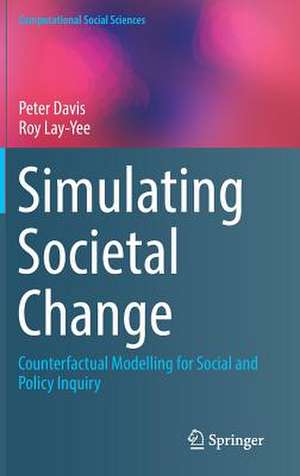Simulating Societal Change: Counterfactual Modelling for Social and Policy Inquiry: Computational Social Sciences
Autor Peter Davis, Roy Lay-Yeeen Limba Engleză Hardback – 12 feb 2019
Din seria Computational Social Sciences
- 15%
 Preț: 649.39 lei
Preț: 649.39 lei - 18%
 Preț: 964.54 lei
Preț: 964.54 lei - 15%
 Preț: 643.34 lei
Preț: 643.34 lei - 15%
 Preț: 640.88 lei
Preț: 640.88 lei - 20%
 Preț: 338.16 lei
Preț: 338.16 lei -
 Preț: 390.63 lei
Preț: 390.63 lei -
 Preț: 395.47 lei
Preț: 395.47 lei - 20%
 Preț: 662.11 lei
Preț: 662.11 lei - 20%
 Preț: 618.05 lei
Preț: 618.05 lei - 20%
 Preț: 760.97 lei
Preț: 760.97 lei - 20%
 Preț: 628.79 lei
Preț: 628.79 lei - 20%
 Preț: 649.93 lei
Preț: 649.93 lei - 20%
 Preț: 761.44 lei
Preț: 761.44 lei - 15%
 Preț: 643.48 lei
Preț: 643.48 lei - 18%
 Preț: 1117.34 lei
Preț: 1117.34 lei - 20%
 Preț: 1169.47 lei
Preț: 1169.47 lei -
 Preț: 432.12 lei
Preț: 432.12 lei - 18%
 Preț: 887.38 lei
Preț: 887.38 lei -
 Preț: 383.93 lei
Preț: 383.93 lei - 20%
 Preț: 241.67 lei
Preț: 241.67 lei - 15%
 Preț: 523.07 lei
Preț: 523.07 lei -
 Preț: 428.07 lei
Preț: 428.07 lei - 15%
 Preț: 693.06 lei
Preț: 693.06 lei -
 Preț: 487.75 lei
Preț: 487.75 lei - 20%
 Preț: 1166.19 lei
Preț: 1166.19 lei - 15%
 Preț: 696.02 lei
Preț: 696.02 lei - 20%
 Preț: 1156.62 lei
Preț: 1156.62 lei - 25%
 Preț: 470.31 lei
Preț: 470.31 lei
Preț: 393.13 lei
Nou
Puncte Express: 590
Preț estimativ în valută:
75.22€ • 78.54$ • 62.26£
75.22€ • 78.54$ • 62.26£
Carte tipărită la comandă
Livrare economică 05-19 aprilie
Preluare comenzi: 021 569.72.76
Specificații
ISBN-13: 9783030047856
ISBN-10: 3030047857
Pagini: 202
Ilustrații: IX, 245 p. 10 illus., 3 illus. in color.
Dimensiuni: 155 x 235 mm
Greutate: 0.54 kg
Ediția:1st ed. 2019
Editura: Springer International Publishing
Colecția Springer
Seria Computational Social Sciences
Locul publicării:Cham, Switzerland
ISBN-10: 3030047857
Pagini: 202
Ilustrații: IX, 245 p. 10 illus., 3 illus. in color.
Dimensiuni: 155 x 235 mm
Greutate: 0.54 kg
Ediția:1st ed. 2019
Editura: Springer International Publishing
Colecția Springer
Seria Computational Social Sciences
Locul publicării:Cham, Switzerland
Cuprins
Chapter1. Introduction.- Chapter2. Conceptual and Analytical Foundations.- Chapter3. SociaLab. A Dynamic Microsimulation Model.- Chapter4. Tracking Societal Change – Its Major Components.- Chapter5. Data Preparation.- Chapter6. Statistical Analysis.- Chapter7. Simulation.- Chapter8. The “Seven Ages”. A Framework for Social and Policy Issues.- Chapter9. Tracking Societal Change. Descriptive Results.- Chapter10. “What If”? Counterfactual Modelling with SociaLab.- Chapter11. Conclusion.
Notă biografică
Peter Davis is Honorary Professor in the Department of Statistics and Emeritus Professor in Population Health and Social Science, at the University of Auckland. He was founding director of the COMPASS (Centre of Methods and Policy Application in the Social Sciences) Research Centre and recently completed a two-year James Cook Fellowship funded by the Royal Society of New Zealand. He has also held the position of Senior Editor (Health Policy) at Social Science and Medicine.
Textul de pe ultima copertă
This book presents a method for creating a working model of society, using data systems and simulation techniques, that can be used for testing propositions of scientific and policy nature. The model is based on the example of New Zealand, but will be applicable to other countries. It is expected that collaborators in other countries can emulate this example with their data systems for teaching and policy purposes, producing a cross-national "collaboratory". This enterprise will evolve with, and to a degree independently of, the book itself, with a supporting website as well as teaching and scientific initiatives. Readers of this text will, for the first time, have a simulation-based working model of society that can be interrogated for policy and substantive purposes. This book will appeal to researchers and professionals from various disciplines working within the social sciences, particularly on matters of demography and public policy.
Caracteristici
Features a full-scale, realistic, working simulation model of society based on demographic and social information and transitioning through time Contains a comprehensive description of the construction of the working model, together with details of a novel open-source micro-simulation method that will facilitate transfer, application and learning across sites Includes worked examples of key policy and substantive questions tested with the simulation model against real data
